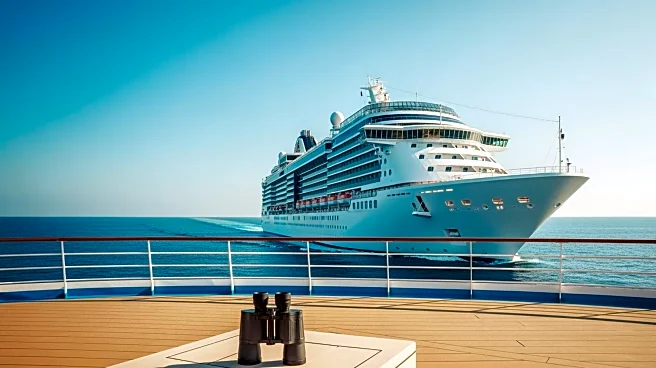What's Happening?
The cruise industry is set to experience unprecedented growth in 2026, with AAA projecting that 21.7 million Americans will embark on ocean cruises. This marks a 4.5% increase from the 20.7 million passengers expected in 2025, following an 8.4% rise from 2024
to 2025. Stacey Barber, Vice President of AAA Travel, attributes this growth to the increasing demand for ocean cruises among U.S. travelers seeking memorable vacation experiences. The demographic of cruise passengers is diverse, with 65% aged 55 and older, 27% aged 35-54, and 7% aged 18-34. The Caribbean remains the most popular destination, capturing 72% of U.S. cruise passengers, followed by Alaska and the Mediterranean.
Why It's Important?
The projected growth in cruise passengers highlights the increasing popularity of cruises as a vacation choice among Americans. This trend is significant for the travel industry, as it suggests a robust recovery and expansion post-pandemic. The rise in cruise demand could lead to economic benefits for related sectors, including tourism, hospitality, and transportation. Cruise lines may see increased revenue and opportunities for expansion, while destinations popular among cruise passengers could experience a boost in local economies. The demographic data indicates a strong interest among older adults, which could influence marketing strategies and service offerings within the industry.
What's Next?
As the cruise industry anticipates record passenger numbers, companies may focus on expanding their fleets and enhancing onboard amenities to cater to the growing demand. Travel agencies and cruise lines are likely to intensify marketing efforts to attract diverse demographics, including families and solo travelers. The industry may also see increased investment in sustainable practices and technology to improve passenger experiences and address environmental concerns. Stakeholders will be closely monitoring economic trends and consumer preferences to adapt strategies and ensure continued growth.
Beyond the Headlines
The surge in cruise popularity could have broader implications for environmental sustainability, as increased passenger numbers may lead to higher emissions and resource consumption. Cruise lines may face pressure to adopt greener technologies and practices to mitigate environmental impact. Additionally, the growth in cruise tourism could influence cultural exchanges and economic development in popular destinations, potentially reshaping local communities and economies.

















